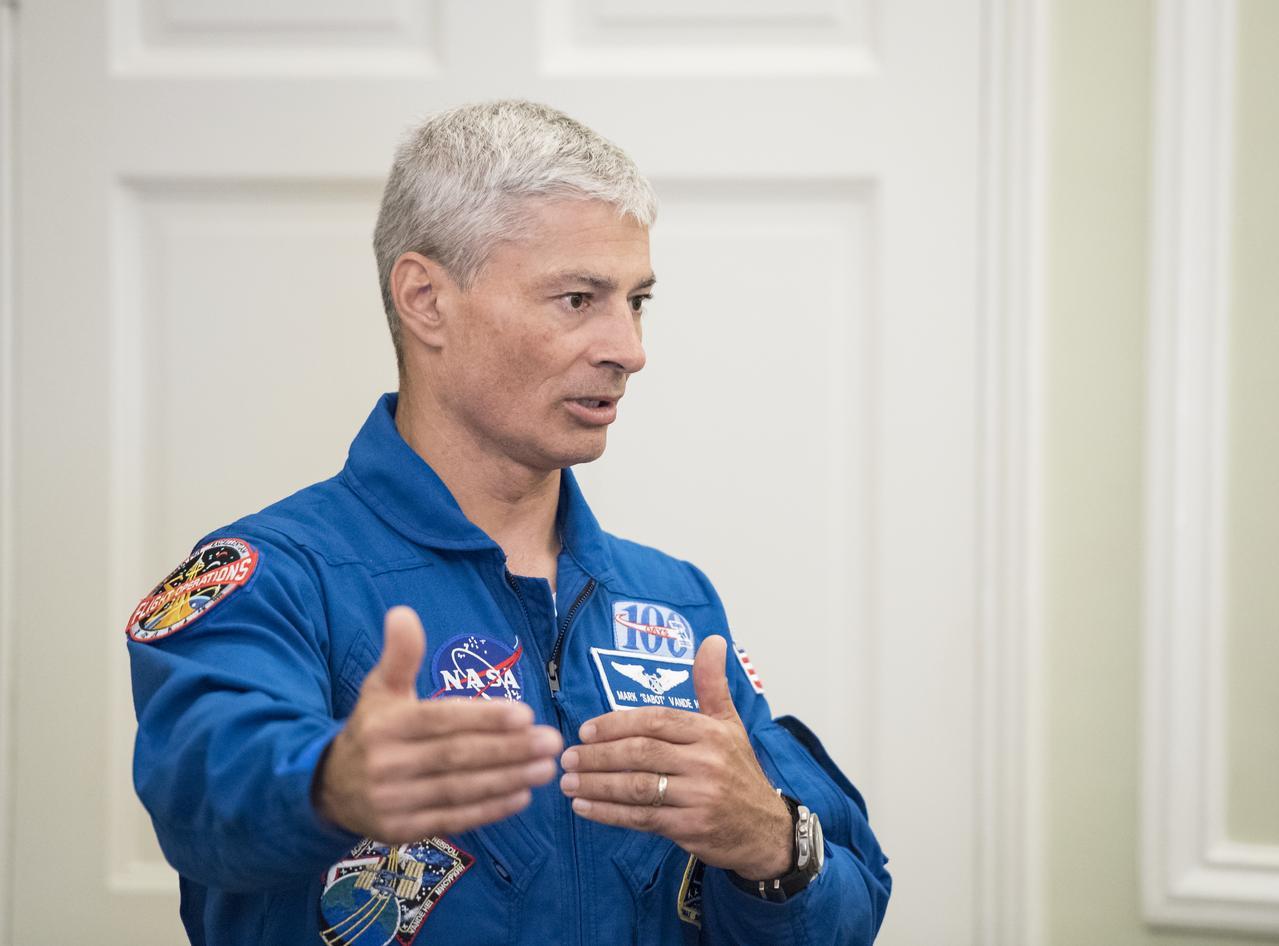NASA Astronaut Vande Hei Reflects On Record-Setting Mission

HOUSTON—NASA astronaut Mark Vande Hei says his U.S. record-setting 355-day mission to the International Space Station (ISS) will help provide valuable insights into the physical and mental challenges of future human expeditions to Mars and other deep-space destinations.
The physicist and retired U.S. Army colonel touched down in remote Kazakhstan on March 30 aboard the Soyuz MS-19 spacecraft with two Russian cosmonauts. He then returned to NASA’s Johnson Space Center and his Houston area home a day later to begin daily rehab sessions to help his body readapt to gravity.
“I’m shocked at how quickly it’s become normal,” an animated Vande Hei told an April 5 NASA news briefing, while acknowledging he feels some physical discomfort. “I’m very happy to be back.”
Vande Hei is among three U.S. astronauts who have spent more than 300 days in space, including the previous U.S. record holder, retired NASA astronaut Scott Kelly, who flew for 340 days in 2015-2016. NASA’s data-gathering Human Research Program would like to see that population increase as the agency’s Artemis human space exploration team focuses on transitions from the ISS to the Moon and Mars.
Valeri Polyakov, a Russian medical doctor, holds the world’s record, 438 days, set in 1994-95 aboard the former Russian Mir space station.
“This mission certainly enhanced my perceptions of feasibility for people serving long duration,” Vande Hei told the briefing. “I do think it’s very important that you follow the exercise protocols that NASA gives you, because they do keep you healthy. And I worked really, really hard at that. It has helped me out a lot.”
Within 8 hr. of his return, Vande Hei was walking, feeling wobbly but “pretty functional.”
Space station astronauts are tasked with 2 hr. of aerobic and resistive exercise each day, a requirement intended to help maintain muscle, bone and cardiac health. Researchers are working to develop more compact but efficient exercise devices for spacecraft smaller than the ISS for deep-space expeditions.
A roundtrip to Mars with current propulsion technologies is estimated to take two to three years.
“Humans are very adaptable and I think that bodes well,” Vande Hei said. “What is satisfying for me is that my body is part of the experiment. I know people are going to have to get data from me and my contributions to that data will help people further explore. That is very satisfying because as I get older, I’m sure I’m going to be watching those things as people much younger than me do some amazing things. There are a lot of challenges ahead. It’s going to be exciting.”
The record-setting mission was his second to the ISS. He spent 168 days in space during his first spaceflight in 2017-2018.
In addition to the physical challenges, Vande Hei offered some insights into the mental challenges of his lengthy confinement aboard the ISS with international crewmates while far from family and friends.
“I think a lot of being able to be successful on the space station or anyplace remotely for that long is going to be how you deal with your own mental health,” he said. “That requires a lot of emphasis, and I felt better on this spaceflight, the longer one, than the previous one because I really put a lot of work into the conversations I would have with myself, my own internal voice.”
He accomplished that by meditating daily as much as possible.
“That really helped me to be more aware of how I was reacting to things. In general, for all of us if we spend all day looking for the most negative things that are happening to us, it will make our outlook on life pretty negative,” Vande Hei said. “If we spend a little extra time focusing on things to be grateful about, we will end up feeling pretty good about things. Noticing the times I was reacting in a negative way and recognizing I didn’t have to do that helped me get through those times and recognize that, wait a minute, this is pretty cool, even though it may seem frustrating at the moment.”
He and his six full-time U.S., Russian and European crewmates aboard the ISS participated in or provided support for more than 300 science investigations and technology development projects. They also took part in the daily maintenance of the ISS and an ongoing effort to upgrade an aging external solar power generation system.
Though he was aware of growing global tensions on Earth over Russia’s invasion of Ukraine, an occasional topic among the crew, Vande Hei said he and his colleagues kept their focus on their work.
“Speaking specifically about my relationship with my Russian crewmates, they are and will continue to be very dear friends of mine,” he said. “We supported each other throughout everything, and I never had any concern about my ability to continue working with them, very good professionals, technically competent and wonderful human beings. I will always be happy that I was able to be on the space station with them.”
When he launched on April 9, 2021, from the Baikonur Cosmodrome in Kazakhstan aboard Russia’s Soyuz MS-18, it was not the same spacecraft on which he returned. It was also unclear how long Vande Hei’s mission might last. Ultimately, that was determined by a short-duration visit to the ISS by a Russian film actress and producer last October.
Vande Hei and cosmonaut Pyotr Dubrov, with whom he launched, gave up their seats so the visiting film duo could return on MS-18.
“I want these 355 days to be remembered as the record that got broken,” Vande Hei said. “I really look forward to the next person doing something longer and us getting farther and farther away and exploring more. So, I want this to be remembered as a steppingstone.”




